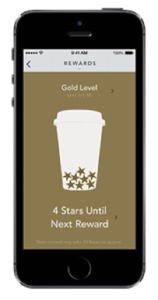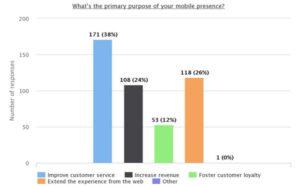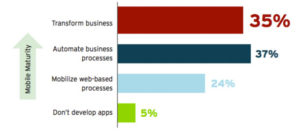How can my business benefit from having a mobile app?
There is a very high probability that most of your clients have a mobile phone in their pocket. Mobile phones are in all of our pockets now aren’t they? Mobiles phones now day aren’t just used for making calls they are used to run a host of applications that serve every imaginable purposes.
Businesses from all around the world that are offering a wide range of products, have begun migrating from the physical world to the virtual realm of the mobile phone application or better known as the mobile app. This includes the migration of physically handing out leaflets, physically printing advertisements, and physically hanging billboard to the virtual realm of the mobile app. You should too!
Now, I know what you might be thinking: Our business doesn’t need a mobile app to sell products to our loyal customers! And maybe that’s been the case in the past. But if you want to prepare for the future and start seeing the massive benefits right out the gate, you’ll need a mobile app. Not so easily convinced? Then here are 4 ways (and then some) that your business will reap the benefits of creating a mobile app for your customers.
1. Provide More Value to Your Customers
Business is all about supply and demand. You as a business supply a product and the market opens their wallets with their demand. The question that you maybe asking yourself is: What is the best way to encourage more of this wallet-opening engagement from your customers. So, you want to increase the customer interaction with your business to promote sales. However, you also want to provide a level of value for your customers that they can’t get anywhere else. One way to address this is to create a loyalty program within your mobile app. It would work like this: The more customers interact with your business and product, the more points they collect, which can in turn be used for great deals on the products they already know they want. For example, Starbucks uses their mobile app to their advantage by offering rewards exclusively to app subscribers, which then motivates customers to buy coffee (and maybe other delicious snacks) from them. They’re even more ahead of the curve by allowing their users to pay directly from the app, speeding up the whole transaction process.
Now, if your business already had a program similar to this in place you could incorporate it into your mobile app, digitizing the entire process, making data on their purchases available to you instantly. If you don’t have one, get on it, fast. And when your customers see their points adding up in real time (rather than having to send in points in the mail or wait until they can access your website to enter them manually), they’ll be impressed and more enticed to follow up on their purchases in the future.
2. Build a Stronger Brand
One of the most important things a mobile app offers to your customers and consumers is awareness of and regular communication with your business and with your business brand. Through regular communication and interaction with your customers your business is fostering trust with those customers. The more your customers trust you and your business the more likely they’ll be to listen to later sales pitches and even commit to your brand. With an app, you’ll demonstrate to your customers why they should trust you by showing (rather than telling) what your brand stands for. In the same way as distributing fridge magnets, calendars, and other random memorabilia with your company logo on it has served in the past both as advertisement and assistance, mobile app strengthen your brand and educate your customers. That’s why so many businesses across all the major sectors are developing strategies for mobile apps. Check out this data from the
Red Hat Mobile Maturity Survey 2015:
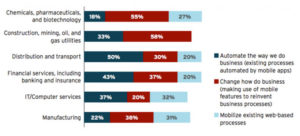
3. Connect Better with Customers
Customer service in businesses today is much more than just face to face communication. Since 2.6 billion people now have high-powered mobile devices within arm’s reach at all times, the true game-changer in customer service is now mobile apps.
Why is a mobile app for your business a necessity for customer service?
Firstly, your app won’t be merely a human being, subject to mood swings and poor performance. And, through a solid mobile presence, you’ll always know you’re presenting to the customer the same face – an interface geared specifically to provide them with the best experience of studying and deciding whether they want to buy your product. In fact, the vast majority of marketers see their apps as a means to primarily improve customer service. Without sounding creepy, your business is always with your customer. (Okay, maybe there’s no way around that one.) But think about it. If a person hears about your app in the middle of the night and wants to get information ASAP, all they have to do is turn on their device and download your app. Later, when a thought pops into their head that they should buy your product, they can do it immediately, without having to wait for regular business hours when normal human beings are awake. So, if customer service is one of your top priorities (like it should be), mobile apps are the answer to raising customer satisfaction across the board.
4. Boost Profits
When customer satisfaction increases, sales typically do too. In fact, according to SalesForce, 70 percent of buying experiences are influenced by how customers feel they’re being treated. The more interested and pleased people become with your product and your business, the greater consumer demand will grow. And let me assure you, if you have a product your customers can’t wait to get their hands on, that demand is going to provide you with some serious returns. That’s where the mobile app comes in like none other. But it’s important to keep costs low while you’re developing it. Sure, you should have a website with a responsible design that can adapt to any of the various mobile devices there are now. This eliminates the necessity of having a frustrating, secondary “mobile” site to manage. But if you launch a mobile app in addition to your responsive website, you’ll boost sales while enhancing the customer experience. According to Techcrunch.com, 35.4 percent of Black Friday sales last year were completed on mobile devices. That’s up from the 16 percent they were just a few years ago, according to 2012 IBM Holiday Benchmark Reports.
When Domino’s Pizza created a mobile app for ordering delivery or in-store pickup of their food, they saw an ecommerce rise of 28 percent in half-year pre- tax profits in the UK alone. And I know I’d rather use their app than actually call the store. In fact, mobile devices now account for 52 percent of their online orders. Are you seeing a trend here? If you aren’t using a mobile app that encourages more purchases while making it easier and more exciting for your customers to press the “buy” button, you’re missing out on a huge chunk of change from an ever-growing market.
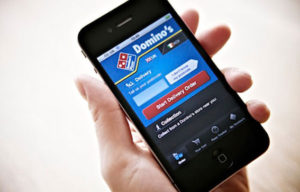
Other Benefits of a Mobile App
If these points haven’t solidified in your brain the necessity of a mobile app, there are still more reasons to consider adopting a mobile app strategy to encourage more customer engagement and satisfaction.
- Inform users of new products and offers
- Stand out from the competition
- Reach out to younger demographics
- Sync users’ email and social media accounts
And if you structure it correctly, you can receive a ton of analytics on exactly how people interact with your app. These range from the average time a user spends looking at your app, to the amount of money you make from every purchase. Another point to think about is location data. Apps are now, more than ever, providing their creators with location data on their users. If you were to apply this to your business, you could learn when and where people were purchasing your products most often, or which parts of the world are most interested in your business. Once you finally decide to develop your app, it may simply start out as a portal to the same options you’ve made available on your company website. But it has room to evolve into so much more. Eventually, you might even rely on your app to inform you as to the new directions you can take your business to continue confidently into the future. If your business were to continue operating without this functionality, you might be left in the dark on these data while your competition takes advantage of it to skyrocket their sales and expand their businesses.
The Bottom Line
90 percent of companies plan to increase investment in mobile apps in 2016. If you don’t, there’s a good chance you’ll be left behind your competitors. And no, a mobile app may not save your business, but it is a sure way of securing a strong presence in your industry. Instead of being some abstract concept of a brand your customers appreciate, that they imagine has a headquarters in some faraway city – you’ll be right in their pockets. Your logo will be placed on their mobile phone screens by default. Just make sure you promote your app after it launches. The convenience factor coupled with the undeniably cool element of new, rapidly evolving technology will place your business on the forefront of your industry. And hey, don’t you want to pull your device out of your pocket and play around on something you helped create? Does your business have a mobile app? If not then contact us immediately to get your business in all your customers pocket.






